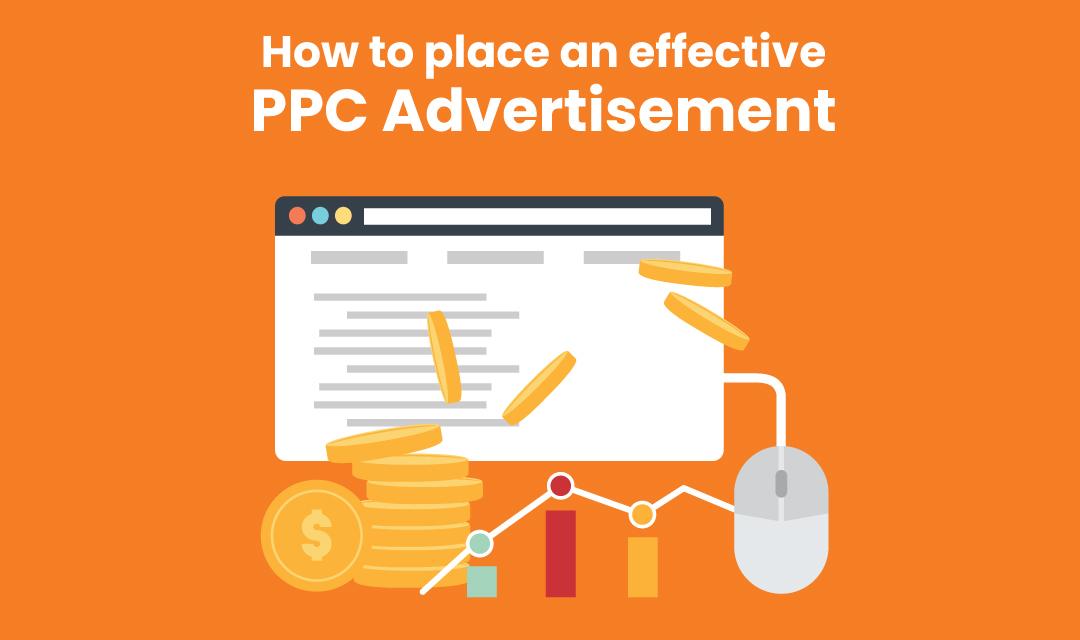
What is PPC?
PPC stands for Pay-Per-Click, and it is the placement of an advertisement on the search engine result pages (SERPs) for a specific keyword phrase in return for a specified payment when a visitor clicks on the link. The PPC link is also known as Sponsored Link, and the advertiser pays an agreed (or bid) amount each time a visitor clicks on the link.
The advertiser generally places PPC advertisements on search engines in the hope of selling products or services on their website. The job of a PPC link is to send targeted traffic to the website (landing page). Regardless of the visitors spending money on your website, you're obligated to pay the agreed sum to the search engine company. One more thing to note is that the advertiser pays nothing to make a sponsored link appear on the SERPs, but pays the fee only when someone clicks on it.
How to place a PPC Advertisement?With the ever-growing e-commerce population, many businesses place advertisements on search engines in the hope of attracting buyers. One of the easiest and quickest ways to attract targeted traffic is by using PPC (Pay-Per-Click) advertisement. The following 4 easy steps will help you place PPC Ads on search engines.
1. Choose your keywords
Choosing the right keywords is a starting point in placing a PPC Ad. The goal is to attract potential buyers to your website (the people who are in the market for purchasing goods that your company offers). Attracting visitors who do not intend to buy reduces the overall conversion ratio, and damage ROI (Return On Investment). There are plenty of free and commercial keyword analysis tools available to help you research your target keywords. Word Tracker is one of most popular tools available which will help you decide on the right keywords.
2. Determine your budget
If you are new to PPC, it's best to use well-known search engines such as Google and Yahoo. Unless you have a good chunk of money to burn, it's generally a good idea to start out small and increase incrementally based on the ROI results. No advertiser can continuously place PPC or any other forms of advertisement if there is no increased revenue from the dollars spent.
3. Decide on Title and Description
The title and description of your advertisement are critical in attracting your potential customers to click on the Ad. The description is generally limited to 200 characters, and some PPC search engines control the text that will appear in the search engine results. True representation of your products and services is critical in increased click-through and conversion ratio.
4. Bid on the keywords
Before you can bid on the keywords, you must register with a search engine marketing company and fund your Ad campaign. You may fund your account with a credit card for a set amount, and may optionally decide to replenish your account when your fund falls below a certain amount. You may use this funding amount to limit the maximum daily Advertisement dollars, in which case Ad stops when the limit is reached.
For each keyword that you would like to advertise, you can place a bid amount ranging from a few cents to several dollars depending on the popularity of the search term. The bidding amount determines the placement of your Ad compared to your competitors.
How to develop an effective PPC Advertisement?
As with any advertisement, a PPC advertisement needs to be crafted in order to produce effective results. There is no known single method that will produce the best result, and hence each advertisement has to be carefully crafted based on the needs of a company. Developing an effective PPC marketing campaign is very time-consuming and costly work if started from scratch. Please use the following tips from the pros to save time and avoid wasting money.
- Contextual Ads (also known as content ads), such as Google AdSense, do not generally produce a good ROI as compared to search Ads. For starters, turn off the content Ads completely or only bid a small fraction of your search Ads.
- Bid on targeted phrases with less competition. General keywords are more expensive and usually produce a lower conversion rate. Use targeted keywords with phrases or exact matches instead of broad matches. To place a phrase match, place quotation marks around your keywords.
- Increase your Ad conversion by tracking your campaign using A/B split testing, and multiple landing pages for greater consistency and relevancy.
- First position isn't always the best. The #1 position will generate more clicks, but not necessarily a good conversion rate. A number of studies show that search positions in #3 to #5 positions generate a better conversion rate than positions #1 and #2.
- Use second-tier PPC search engines such as Kanoodle, Findwhat, Epilot, and Enhance. Bidding on popular keywords in Google and Yahoo can be very expensive, but the same keywords will cost a lot less on second-tier search engines. Those second-tier engines will generate less traffic than the incumbents, but they are cheaper.
Share this post
Leave a comment
All comments are moderated. Spammy and bot submitted comments are deleted. Please submit the comments that are helpful to others, and we'll approve your comments. A comment that includes outbound link will only be approved if the content is relevant to the topic, and has some value to our readers.

Comments (0)
No comment